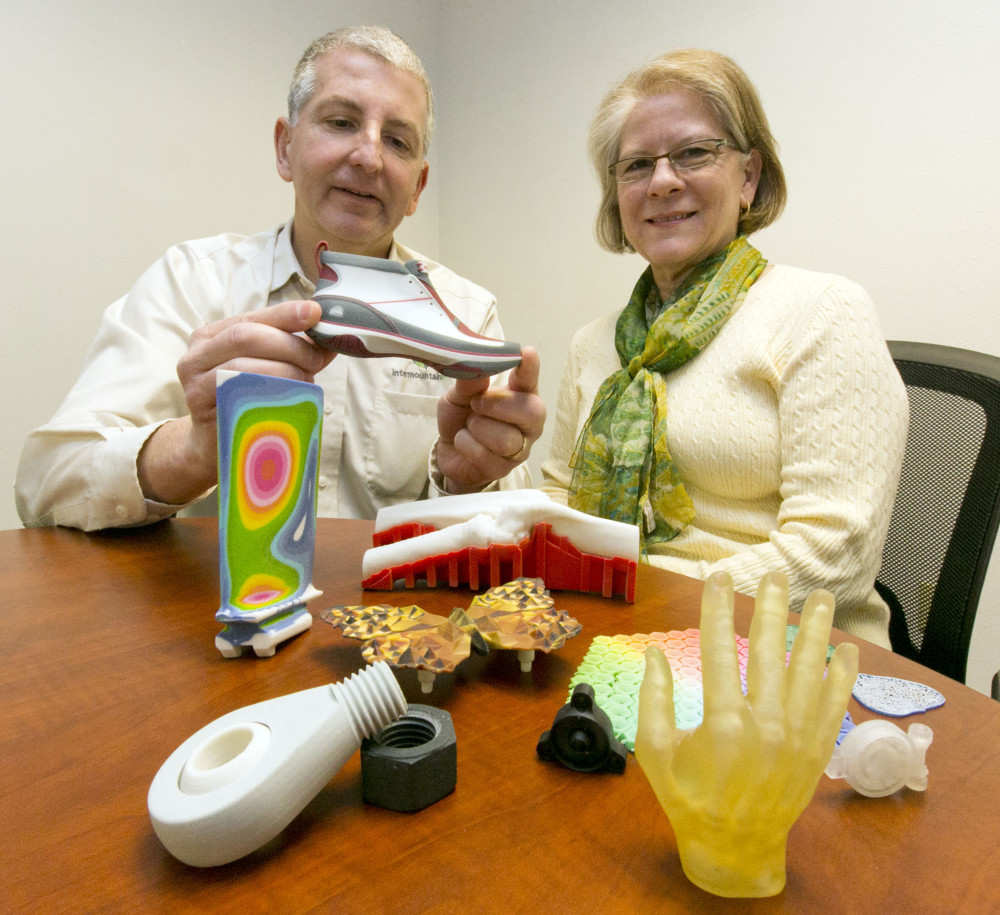By Audrey Dutton
The Idaho Statesman.
BOISE, Idaho
Lynn Hoffmann and husband Brian Hoffmann opened Intermountain 3D Inc. in December. Lynn Hoffmann retired two years ago from leading the Idaho Nonprofit Center, after having worked in marketing and business management for Hewlett-Packard. Brian Hoffmann worked in 2-D printing for HP. They decided to finance the business themselves.
“I never thought I’d go back into the for-profit world, to tell you the truth, but this business with my husband is a great adventure I couldn’t pass by,” she says.
The business sells new 3-D printing equipment from 3D Systems Inc., and it provides rapid prototyping services for customers who need 3-D-printed parts.
This kind of 3-D printing isn’t for doodads and paperweights, though. The printers at Intermountain 3D are capable of serving the needs of engineers, product developers, industrial designers and manufacturers, using specialized print files.
If the Hoffmanns’ business can’t fulfill an order, it taps into a network of peers across the country.
Locally, they’ve developed an affiliation with Boise State University’s TechHelp, a collaboration between Idaho’s three state universities aimed at advancing Idaho’s manufacturing sector. TechHelp has committed to buying a multi-jet 3-D printer and locating it in Intermountain 3D’s offices, Lynn Hoffmann says.
Q: How much did you have to invest to open this high-tech business?
A: We purchased three commercial 3-D printers and associated digital workflow products to operate our service bureau, and we equipped our office with production and post-processing areas. The printers range in price from $5,000 to $250,000. Because our business serves Idaho as well as the Intermountain West, we have invested in a robust website, including an online quoting tool to provide instant quotes for parts production and an online store for equipment and consumable sales.
Q: When do you expect to turn a profit?
A: We will be cash-flow positive in the first year and expect to be servicing a steady and profitable customer base in 2016.
Q: How much do you charge?
A: Our service-bureau pricing is tied to the type and amount of material used, post-processing complexity and finishing requirements. Typical printed plastic parts are $30 to $50 per cubic inch of printed material, plus any additional required services.
For 3-D printing equipment sales, there is a wide variety of products, many of which are designed for specific applications and industries. Most of the professional equipment is configured to specifically meet customers’ needs and is priced accordingly. The range can span from $1,000 to $1 million depending on the 3-D printing technology, material, size and speed.
A laser-based metal sintering machine for the creation of titanium parts for aerospace will naturally be priced significantly higher than a small 3-D printer designed for professional jewelers that prints in plastic or wax for metal casting purposes.
Q: What led you to open this business?
A: 3-D printing has always been an interest of ours, and we have watched as the technology has advanced over the years. We believe that 3-D printing, or more broadly, additive manufacturing, has the ability to transform manufacturing in a very positive way. We strongly believe that a robust manufacturing industry not only creates a wide range of high-quality jobs but is an integral part of truly sustainable economies. Commercial 3-D printing has the potential to revolutionize the way manufacturing is done and bring innovative new capabilities to all manufacturers, large and small.
Q: How busy have you been so far?
A: In our first few weeks, we saw fascinating projects from research labs, jewelers, manufacturers of temperature-controlled equipment and energy companies. We think the commercial application of this technology has just barely brushed the surface of its potential.














































































































































































































































































































































































